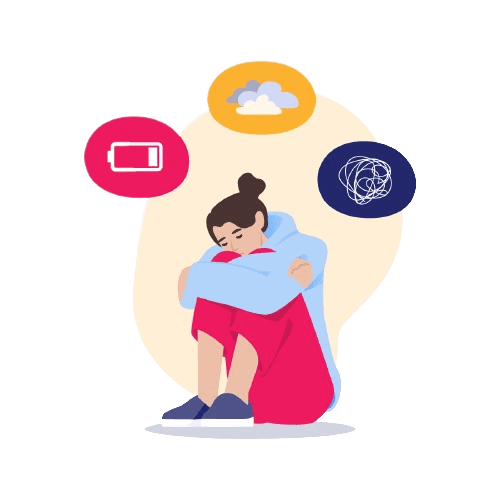Depression Assessment
3 Min Free Depression Assessment
"*" indicates required fields
What is Depression?
Depression is a mental health disorder characterized by persistent feelings of sadness, loss of interest or pleasure in activities, and a range of physical and emotional symptoms. It is a common and serious medical condition that can affect how a person thinks, feels, and behaves.
Depression can have a significant impact on various aspects of a person’s life, including their relationships, work or school performance, and overall well-being. It is different from normal fluctuations in mood or temporary feelings of sadness, as it tends to be more severe, persistent, and interfere with daily functioning.

Symptoms of Depression
The symptoms of depression can vary from person to person, but they often include:
- Persistent sadness or a low mood.
- Loss of interest or pleasure in activities once enjoyed.
- Changes in appetite and weight (either significant weight loss or gain).
- Fatigue or loss of energy.
- Sleep disturbances (insomnia or excessive sleeping).
- Feelings of worthlessness, guilt, or self-blame.
- Restlessness or slowed movements.
- Difficulty concentrating, making decisions, or remembering things.
- Recurring thoughts of death or suicide.

Who Can Benefit From This Depression Assessment?
The depression assessment can benefit individuals experiencing prolonged sadness, loss of interest, changes in appetite or sleep patterns, fatigue, guilt, difficulty concentrating, restlessness, or thoughts of death. It provides a preliminary evaluation of depressive symptoms, helping individuals gain insight into their mental well-being.
While it does not offer a formal diagnosis, it serves as a valuable screening tool. Those who identify potential depression symptoms through the assessment can seek professional help from healthcare providers like psychiatrists, psychologists, or therapists for further evaluation and appropriate treatment options, promoting overall well-being and recovery.
Types of Depression Assessment
Patient Health Questionnaire-9 (PHQ-9):
PHQ-9 is a widely used self-report questionnaire that assesses the severity of depressive symptoms based on the criteria of the Diagnostic and Statistical Manual of Mental Disorders (DSM-5).
Edinburgh Postnatal Depression Scale (EPDS):
EPDS is a screening tool specifically for postnatal depression. It assesses symptoms experienced by new mothers, such as mood changes, guilt, and anxiety.
Hamilton Rating Scale for Depression (HAM-D):
HAM-D is a clinician-administered assessment tool that evaluates the severity of depressive symptoms. It consists of 17 items covering various aspects of depression, including mood, guilt, insomnia, and anxiety.
Geriatric Depression Scale (GDS):
GDS is specifically designed for older adults and assesses depressive symptoms common in this population. It includes yes/no questions related to mood, motivation, and physical symptoms.
Beck Depression Inventory (BDI):
BDI is a self-report inventory that measures the presence and severity of depressive symptoms. It consists of a series of questions related to mood, cognition, physical symptoms, and behavior.
Children's Depression Inventory (CDI):
CDI is a self-report questionnaire designed to assess depression in children and adolescents. It includes items related to mood, self-esteem, social withdrawal, & academic difficulties.
Treating Depression
Treating depression typically involves a combination of approaches tailored to the individual’s needs. Here are some common treatment options:
- Psychotherapy: Psychotherapy, or talk therapy, is an effective treatment for depression. Cognitive-behavioral therapy (CBT) is a widely used approach that helps individuals identify and change negative thought patterns and behaviors contributing to their depression. Other types of therapy, such as interpersonal therapy (IPT) and psychodynamic therapy, may also be beneficial.
- Medication: Antidepressant medications, such as selective serotonin reuptake inhibitors (SSRIs) or serotonin-norepinephrine reuptake inhibitors (SNRIs), can be prescribed to help manage depressive symptoms. It’s important to consult a healthcare professional who can assess the need for medication, prescribe appropriate medications, and monitor their effectiveness and potential side effects.
- Lifestyle changes: Engaging in regular exercise, maintaining a balanced diet, and getting sufficient sleep can positively impact mood and overall well-being. Avoiding excessive alcohol or drug use and incorporating stress-reduction techniques like mindfulness or meditation can also be helpful.
- Social support: Building a strong support system by confiding in trusted friends or family members and participating in support groups can provide emotional support and reduce feelings of isolation.
- Self-care practices: Engaging in activities that bring joy and relaxation, such as hobbies, creative outlets, or spending time in nature, can help improve mood and reduce stress.
- Alternative therapies: Some individuals find complementary and alternative therapies beneficial, such as acupuncture, yoga, or herbal supplements. It’s important to consult with healthcare professionals before integrating such therapies into the treatment plan.
- Collaborative care: In severe cases or when symptoms persist despite initial treatment, a comprehensive approach involving a multidisciplinary team of healthcare professionals may be recommended. This can include psychiatrists, psychologists, therapists, and primary care physicians working together to provide integrated care.
Treatment for depression should be individualized, and what works for one person may not work for another. It is crucial to work closely with healthcare professionals to develop a personalized treatment plan and to regularly assess progress and make adjustments as needed.

